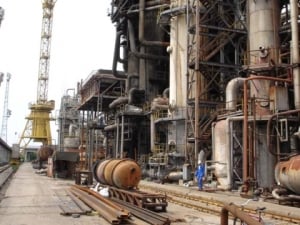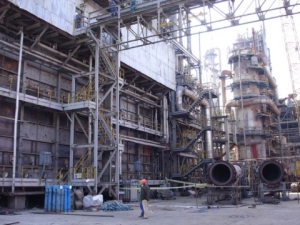Ammonium nitrate-producing plants face a constant battle against corrosion so the choice of material is critical.
Nitric acid at a 60% – 65% concentration is typically used. Nitric acid is strong but is only extremely corrosive in high concentrations or high temperatures.
The corrosion of heat exchanger tubes and shells can cause costly downtime. This is due to the need for maintenance and re-tubing. Selecting advanced and cost-effective materials can solve corrosion and boost performance.
The background

Producing ammonium nitrate uses nitric acid heaters to neutralize the acid with ammonia gas.
A customer was using a 58%-60% concentration of nitric acid for neutralization. The acid was heated to 75°C - 90°C to create vapor and condensate. A four-way shell-and-tube heat exchanger with 261 pipes and an operating temperature of up to 100°C was used.
The unit was originally made from titanium in 1987. However, titanium has reduced resistance in intermediate nitric acid concentrations. Challenges in welding, repairing, and sourcing titanium to replace the pipes meant a move away to an advanced material was needed.
The solution
Since 1993 titanium heaters have been replaced by ones made from Alleima™ 2RE10. The austenitic stainless steel grade was developed for nitric acid and resists general corrosion at higher temperatures. This increases the lifetime of equipment over standard grades. The advanced material is suitable for tubing used in heaters or condensers with accelerated corrosion rates. It’s highly resistant to corrosion and has extremely low carbon and impurity levels. It has excellent resistance to intergranular corrosion, good pitting resistance, and good weldability.

The result
Nitric acid heaters made from this advanced material have produced good results over many years. Alleima has also supplied plates for the tube sheets using materials that meet the grade’s requirements.
Using Alleima advanced materials significantly reduces maintenance and re-tubing downtime. It also accelerates the production of ammonium nitrate.
Learn about our risk-reducing nitric acid range here.